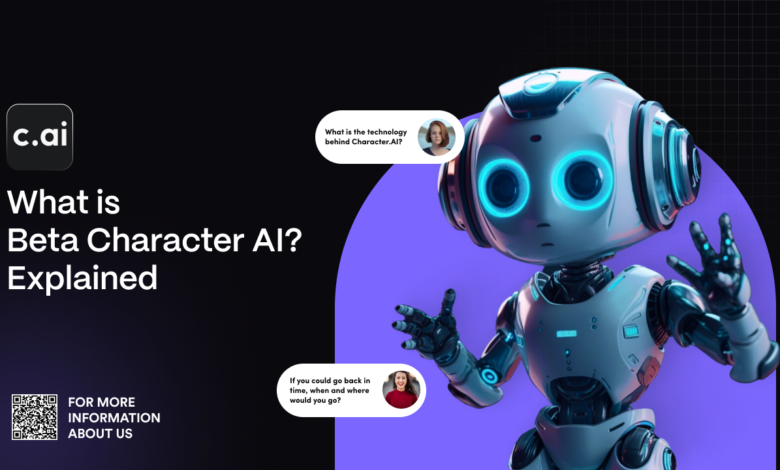The Rise of Beta Character AI: Transforming Digital Interaction

Artificial intelligence (AI) is constantly evolving, and one of the most exciting developments is Beta Character AI. As a cutting-edge innovation, Beta Character AI is redefining how we interact with digital environments, virtual characters, and intelligent systems. From enhancing gaming experiences to improving customer service, Beta Character AI is set to reshape various industries. In this article, we explore what Beta Character AI is, how it enhances digital interactions, its applications across sectors, and the ethical considerations that come with this technology.
What is Beta Character AI?
Beta Character AI is an advanced type of artificial intelligence designed to create and simulate dynamic, interactive characters with distinct personalities, behaviors, and emotional responses. Beta Character AI learns from user interactions rather than traditional AI, which primarily relies on predefined algorithms and responses. It adapts over time, allowing for more realistic and personalized experiences. This ability to evolve and simulate nuanced personalities sets Beta Character AI apart from earlier forms of virtual assistants or simple NPCs (non-playable characters) in video games.
The technology behind Beta Character AI is rooted in several key AI technologies, including Machine Learning (ML), Natural Language Processing (NLP), and Data Modeling. Machine Learning allows the AI to improve its understanding and responses based on ongoing interactions. Natural Language Processing enables Beta Character AI to understand and process human language, making interactions smoother and more intuitive. Data modeling, on the other hand, helps the AI create accurate representations of character traits and behaviors, allowing it to develop deeper personalities that resonate with users.
This blend of advanced technologies allows Beta Character AI to offer a far more engaging and lifelike experience. The characters are not just reactive; they can remember past interactions and adapt their behaviors accordingly, making the experience feel much more personal and unique to each user.
How Beta Character AI Enhances Digital Interaction

Beta Character AI enhances digital interaction, particularly in virtual environments such as video games, simulations, and online platforms. Traditional AI has always been limited to offering predefined responses or actions, but Beta Character AI is designed to make these experiences more immersive and realistic. Beta Character AI fosters more profound connections between users and virtual characters by simulating personalities and human-like interactions.
In gaming, Beta Character AI transforms how players engage with NPCs. Instead of encountering static characters that repeat the same lines and actions, players interact with AI-driven characters that evolve. These characters can form relationships, remember past conversations, and adapt to the player’s choices. For example, in role-playing games (RPGs), NPCs powered by Beta Character AI can offer tailored quests based on previous interactions, or even change their attitudes and behaviors based on how the player treated them in earlier encounters.
Moreover, Beta Character AI helps break down the limitations of scripted content. In interactive entertainment like virtual reality (VR), AI characters can engage in more fluid, dynamic conversations with users. This creates a much more immersive experience where characters feel alive, responding to user input in a natural and intuitive way. For example, Beta Character AI can act as a mentor or guide in VR-based training programs or educational simulations, offering personalized feedback and suggestions as users navigate the experience.
Applications of Beta Character AI Across Different Industries
Beta Character AI has broad applications across various industries, each benefiting from its ability to create engaging and personalized experiences. Below, we explore some of the most notable uses of this technology in entertainment, education, customer service, and healthcare.
Entertainment
Beta Character AI is revolutionizing the way virtual characters are created and interacted with in the entertainment industry. Video games, particularly those in the RPG and adventure genres, are seeing a substantial shift thanks to AI-driven characters that can evolve and respond to players. Instead of static dialogues and predictable behavior, these characters react intelligently to player choices, creating a richer, more engaging story.
Beta Character AI also has applications in film and virtual reality. Imagine characters in VR films that change their reactions based on the viewer’s actions, offering a unique and personalized cinematic experience. This interaction would significantly blur the lines between passive and active entertainment.
Education
Beta Character AI is also making a considerable impact in the educational sector. AI-powered virtual tutors or assistants can now provide one-on-one, customized learning experiences for students. These virtual educators can adapt their teaching styles and content delivery methods based on the student’s progress, making learning more engaging and effective.
For example, a Beta Character AI could be a historical figure in a classroom simulation, helping students learn through interactive conversations. This approach can make complex subjects more relatable and fun, encouraging more profound engagement with the material.
Customer Service
In customer service, Beta Character AI is improving user experiences by providing dynamic, intelligent virtual assistants. These AI-driven agents can handle various customer inquiries, offering personalized responses based on customer history and preferences. Unlike traditional chatbots that rely on scripted answers, Beta Character AI can adapt its responses to reflect the tone, urgency, and context of each conversation, improving overall satisfaction.
For businesses, the ability to offer 24/7 personalized service can drastically improve customer relations and reduce wait times, leading to better customer and company outcomes.
Healthcare
In healthcare, Beta Character AI is being used to provide virtual companions for mental health support and help patients manage chronic conditions. AI characters in therapeutic settings can provide emotional support, offer encouragement, and guide patients through exercises or mindfulness practices. These virtual companions are designed to simulate empathy and understanding, offering a valuable resource for patients who may feel isolated or need extra care outside traditional therapy sessions.
Furthermore, Beta Character AI can play a key role in patient education by providing information on treatment plans, medication, and lifestyle changes. By tailoring these messages to individual patient’s needs, the AI ensures that patients receive the most relevant information in an engaging and accessible manner.
Ethical Considerations and Challenges of Beta Character AI
While Beta Character AI offers many exciting possibilities, it also raises several ethical considerations that must be addressed. One of the primary concerns is privacy. Since these AI characters often interact with users on a personal level, they may collect sensitive data during these exchanges. Strict data protection measures must be in place to ensure that this information is not misused.
Another ethical challenge is bias. Like all AI systems, Beta Character AI is trained on data that can be biased. If the data used to train the AI is not diverse or representative, the AI characters could unintentionally perpetuate harmful stereotypes or biases. This raises questions about developers’ responsibility to ensure fairness and inclusivity in their AI creations.
Another concern is the emotional dependency that users may develop on AI characters. While AI characters can simulate empathy and provide support, they are ultimately not human, and users may start to rely on them for emotional needs. This could have negative consequences on users’ mental health, mainly if the AI characters are used to replace real-life social interactions.
Finally, the transparency of AI decision-making processes is crucial. Users need to be informed about how their interactions with Beta Character AI are being used and how decisions are made. Without transparency, AI systems can become a “black box,” leaving users in the dark about how their data is being processed or how decisions are being made.
Conclusion
Beta Character AI is undoubtedly changing how we interact with digital environments, from video games to customer service to mental health applications. This innovative technology offers a more personalized and engaging experience, enhancing user interaction by simulating human-like characters with distinct personalities and behaviors. However, as with any emerging technology, Beta Character AI must be developed and deployed ethically, with considerations for privacy, bias, and emotional well-being.
The future of Beta Character AI is promising. As advancements continue, we can expect even more innovative applications that will impact industries across the globe. By addressing ethical challenges and ensuring responsible use, Beta Character AI has the potential to redefine digital interaction in a variety of sectors.
FAQs
- What is the main difference between Beta Character AI and other types of AI? Beta Character AI evolves and learns from interactions, simulating dynamic personalities, unlike traditional AI that relies on static programming.
- How does Beta Character AI improve user experience in virtual games? It creates evolving characters, offering more personalized interactions, changing based on player choices, and enhancing the overall gameplay experience.
- What are some industries using Beta Character AI? Beta Character AI is used in entertainment, education, customer service, and healthcare to improve engagement, learning, and support.
- Is Beta Character AI safe for children? While Beta Character AI can be a fun and educational tool, parental supervision is recommended to ensure appropriate and safe interactions.
- What ethical issues arise from the use of Beta Character AI? Key problems include privacy concerns, potential bias in AI behavior, emotional dependency, and the transparency of AI decision-making processes.
- Can Beta Character AI replace human interaction in customer service? While Beta Character AI can handle many customer inquiries, it best complements human agents, especially for more complex or emotional interactions.
- How does Beta Character AI handle user emotions? Beta Character AI uses data modeling and NLP to simulate empathy, offering emotional support in a natural and personal way.
- Will Beta Character AI be a common feature in future video games and virtual reality? As the technology improves, Beta Character AI will likely become a standard feature in games and VR experiences, offering deeper engagement and personalization.
You May Also Read:https://profeshnalseowork.com/naz-tricks/





